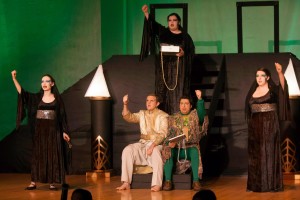There are no plays planned for this semester at Houghton. The school’s theater clubs have experienced a dearth of interest from the student body. This loss of momentum is a result of several factors, yet there is movement on the part of the faculty to breathe life into Houghton theater.
Wynn Horton, ’15, has been deeply involved with theater in his time at Houghton. He expressed his concern, “2014-2015 is the first of several years at Houghton in which there has been no theatre. We have had a plethora of plays and musicals over the last 4 years and now hit a drought.”
 There are two active theater groups on campus: Encore and Houghton Musical Theater Players. Formerly, the Shakespeare Players put on works by their namesake before being subsumed into Encore. These groups have faced an economic challenge over the past few years as the cost of copyright has become greater than net revenue from the production.
There are two active theater groups on campus: Encore and Houghton Musical Theater Players. Formerly, the Shakespeare Players put on works by their namesake before being subsumed into Encore. These groups have faced an economic challenge over the past few years as the cost of copyright has become greater than net revenue from the production.
With the reduction of the student body, there are fewer students participating in productions though the overall percentage of students interested in the performing arts may not have changed. Encore president Sarah Wright views the problem as a, “vicious circle.” As a result of fewer students participating in productions, other students know less about the productions because they don’t permeate as much of the campus population, thus even fewer students participate in later productions. This cycle runs parallel to another. The lack of funding for the plays means that they cannot have as high a quality as they would otherwise. This results in a lack of attendance, and therefore a lack of funding for further performance ventures. The solution might be to change ticket prices, however, if they are raised, the audience will shrink. If they are lowered, the overall revenue might shrink as well.
It is difficult to find a clear answer to breaking this cycle. It may not be able to raise itself up from its current status without outside help. Encore has made several efforts to increase its appeal to students. They have held an activity themed workshop on stage make-up that they had hoped would be joined by other theater-centric workshops. The low attendance of the first workshop cancelled any further plans of this kind. They have also looked into performing smaller plays, such as one-acts. Professor Wardwell suggested they participate in a 72-hour “Theater Blitz” wherein a play is written, cast, and performed in 3 days. The size of these productions make them a better fit for the present interest and funding. Their short term involvement means students aren’t required to commit as much time to them.
These efforts have been matched by further challenges. Theater groups have had trouble renting spaces to practice and even perform plays, relegating them to classrooms until opening night. The Encore Theater Group recently had to relocate their props and equipment from the building now occupied by Addie’s Ice Cream. The group understands the need for the move, but found the replacement location provided by the college meant having to throw away half of their props due to size constraints.
There is a chance that the dry spell of theater interest could be part of a larger cycle. Horton thinks that it parallels other Houghton activities, “It makes sense that one group of students had the momentum to pull off large theatre productions while others don’t. In the same way, other student organizations or campus events go through similar ebb and flow patterns. For example, the student government’s presence and interest in it comes and goes, SPOT and its talent/entertainment value comes and goes, and clubs like the Pro-life Club or Math Clubs come and go depending on whether or not there are students to lead them.” Horton said, “Theatre clubs are the same, if no one steps up or there’s no interest, then there’s no theatre. The only difference is, when musicals and plays have become almost habitual – people notice when they’re missing. I’d love to see someone make theatre happen again.”
Professor Susan Lipscomb wants to encourage a rekindled interest in Houghton productions through faculty intervention. She, along with professors Gaerte and Wardwell are working towards bringing a director as resident on campus for the upcoming three years. The director would come and spend four weeks working solely on producing a play alongside Houghton students. The cost of this residency would be paid for by an application of the Van Gorden Fund, which is dedicated to nurturing English, theater, and the arts. The three-year pilot will be vetted for a continuation of the program in subsequent years.
Professor Wardwell sees theater as an important component to life on a college campus. In his view, theater serves a human, not just educational, benefit. Horton agrees, “The stage is a medium that can truly be used as a platform or arena for conversations of all kinds and of all temperatures – perhaps even some of the edgy conversations Houghton has been avoiding over the last few years? Acting also encourages those on stage to truly put themselves in the shoes of others, and sometimes even legitimize estranged people groups or taboo topics. Regardless of theatre’s social value, it is entertaining, and we all know Houghton can never have enough of that during the cold winter months.”
